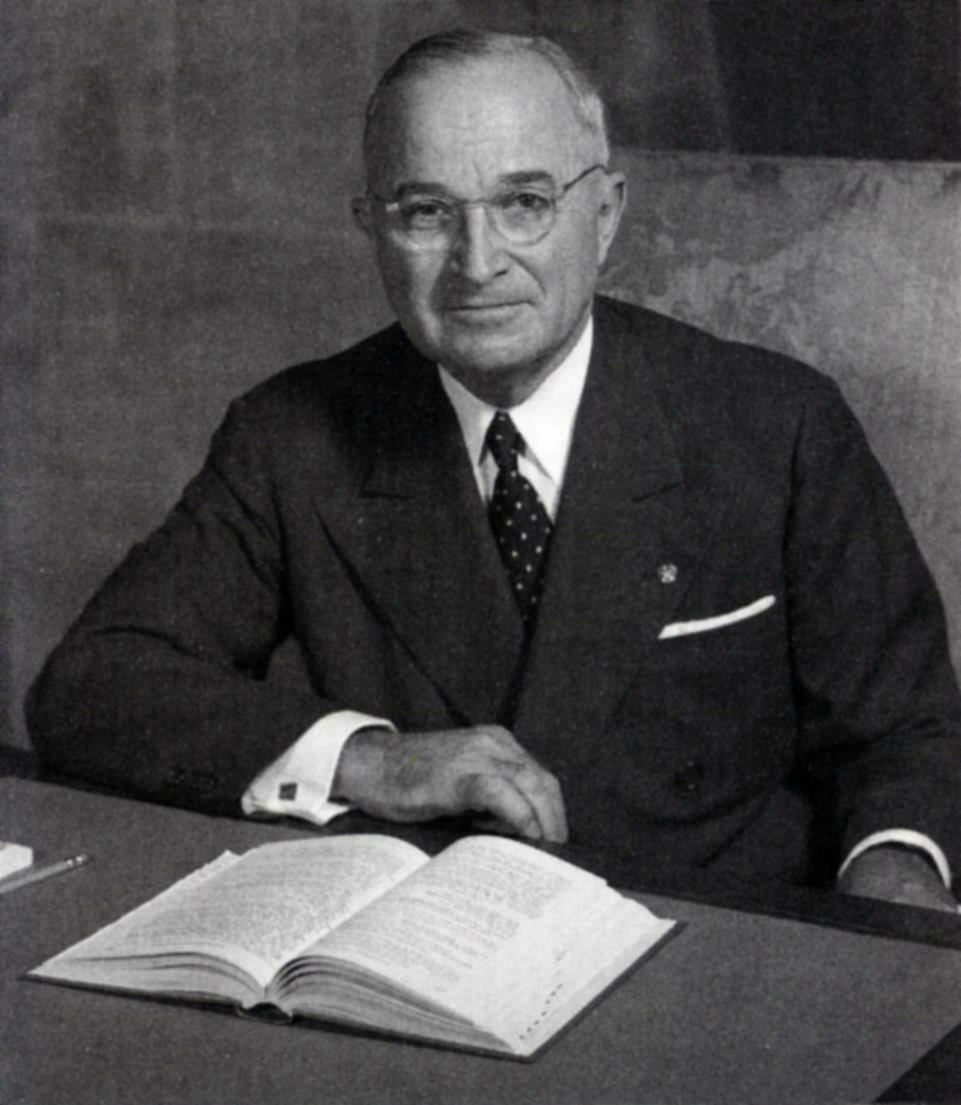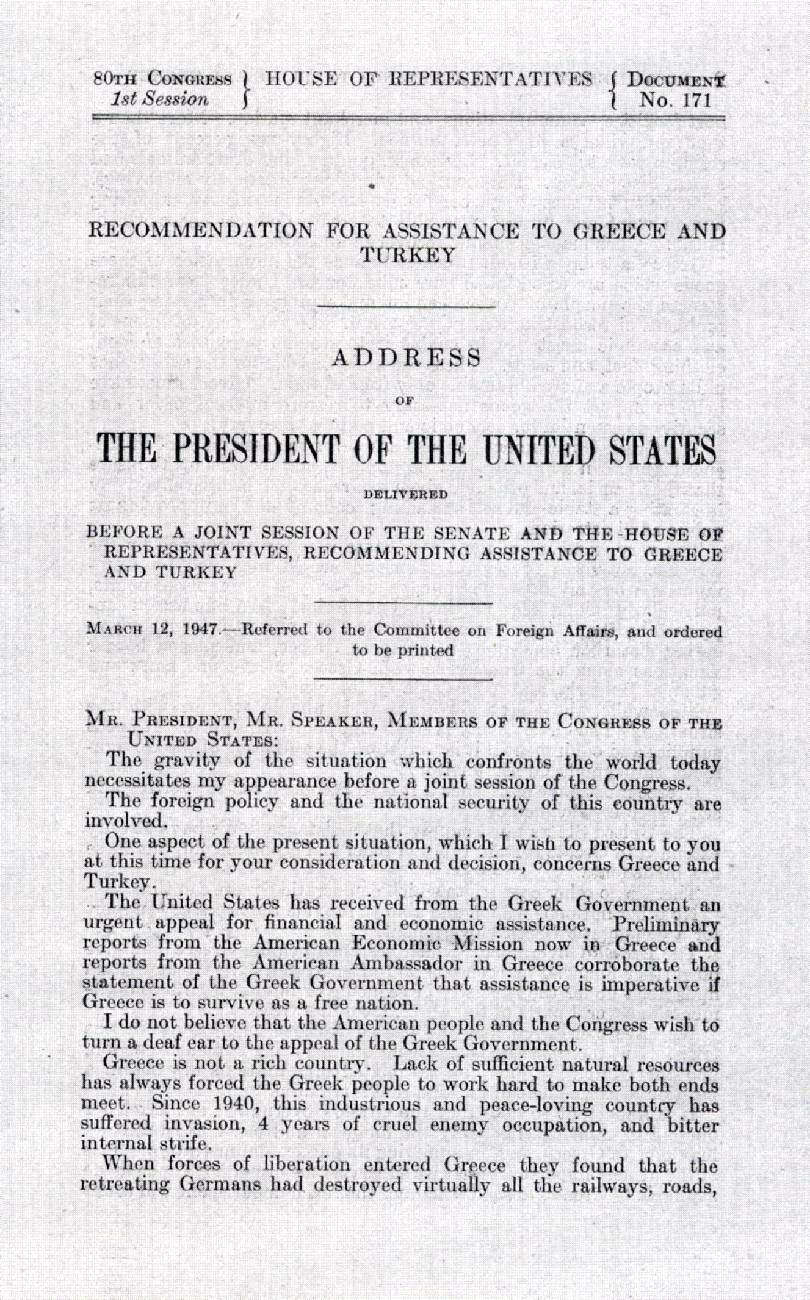The
Truman Doctrine |


When World War II ended in I945, Europe lay in ruins: its cities were shattered; its economies were devastated; its people faced famine. In the two years after the war, the Soviet Union's control of Eastern Europe and fears that communism would gain a foothold in Western Europe—whose countries were either political allies or important trading partners of the United States—heightened the U.S. sense of crisis. Soon after the Nazis withdrew, Greece found itself engaged in a civil war. American policymakers began monitoring that country's crumbling economic and political situation, especially the rise of the Communist-led insurgency known as the National Liberation Front. They feared that further deterioration would lead. to an overthrow of the Greek government, which was nominally democratic. The United States had also been following events in Turkey, where a weak government faced Soviet pressure to share control of the strategic Dardanelle Straits. Great Britain, which had been providing financial aid to the free and independent governments of Greece and Turkey, was forced to withdraw it in February 1947 when it could no longer afford the expense. Responsibility for supporting these two governments fell to the United States, the only western democracy with sufficient financial resources at that time. In a meeting between U.S. Congressmen and State Department officials, Undersecretary of State Dean Acheson articulated what would later become known as the domino theory. He contended that if Greece and Turkey should fall, communism would probably spread south to Iran and as far east as India. To prevent the growth of communism, the legislators agreed to endorse aid on the condition that President Truman explain the severity of the crisis in an address to Congress and in a radio broadcast to the American people.
Speaking to a joint session of Congress on March 12, 1947, President Truman asked for $400 million in military and economic assistance for Greece and Turkey and established the Truman Doctrine, which would guide U.S. diplomacy for the next forty years. Truman declared, "It must be the policy of the United States to support free peoples who are resisting attempted subjugation by armed minorities or by outside pressures." Aid for Greece and Turkey marked, the beginning of bipartisan foreign policy aimed at containing communism, a motive that dictated, most U.S. actions throughout the Cold War.

RECOMMENDATION FOR ASSISTANCE TO GREECE AND TURKEY MR. PRESIDENT, MR. SPEAKER, MEMBERS OF THE CONGRESS OF THE UNITED STATES:
The gravity of the situation which confronts the world today necessitates my appearance before a joint session of the Congress. The foreign policy and the national security of this country are involved....
The United States has received from the Greek Government an urgent appeal for financial and economic assistance.... [Assistance is imperative if Greece is to survive as a free nation.
Greece is not a rich country. Lack of sufficient natural resources has always forced the Greek people to work hard to make both ends meet. Since 1940, this industrious and peace loving country has suf- fered invasion, four years of cruel enemy occupation, and bitter internal strife....
Greece is today without funds to finance the importation of those goods which are essential to bare subsistence. Under these circumstances the people of Greece cannot make progress in solving their problems of reconstruction. Greece is in desperate need of financial and economic assistance to enable it to resume purchases of food, clothing, fuel and seeds. These are indispensable for the subsistence of its people and are obtainable only from abroad. Greece must have help to import the goods necessary to restore internal order and security so essential for economic and political recovery.
The Greek Government has also asked for the assistance of experienced American administrators, economists and technicians to insure that the financial and other aid given to Greece shall be used effectively in creating a stable and self-sustaining economy and in improving its public administration.
The very existence of the Greek state is today threatened by the terrorist activities of several thousand armed men, led by Communists, who defy the government's authority at a number of points, particularly along the northern boundaries. A Commission appointed by the United Nations Security Council is at present investigating disturbed conditions in northern Greece and alleged border violations along the frontier between Greece on the one hand and Albania, Bulgaria, and Yugoslavia on the other....
The British Government, which has been helping Greece, can give no further financial or economic aid after March 51. Great Britain finds itself under the necessity of reducing or liquidating its commitments in several parts of the world, including Greece.
We have considered how the United Nations might assist in this crisis. But the situation is an urgent one requiring immediate action and the United Nations and its related organizations are not in a position to extend help of the kind that is required.
No government is perfect. One of the chief virtues of a democracy, however, is that its defects are always visible and under democratic processes can be pointed out and corrected. The Government of Greece is not perfect. Nevertheless it represents eighty-five per cent of the members of the Greek Parliament who were chosen in an election last year. Foreign observers, including 692 Americans, considered this election to be a fair expression of the views of the Greek people....
Turkey also deserves our attention....
Since the war Turkey has sought financial assistance from Great Britain and the United States for the purpose of effecting that modernization necessary for the maintenance of its national integrity....
The British government has informed us that, owing to its own difficulties it can no longer extend financial or economic aid to Turkey....
We are the only country able to provide that help....
One of the primary objectives of the foreign policy of the United States is the creation of conditions in which we and other nations will be able to work out a way of life free from coercion....
At the present moment in world history nearly every nation must choose between alternative ways of life. The choice is too often not a free one.
One way of life is based upon the will of the majority, and is distinguished by free institutions, representative government, free elections, guarantees of individual liberty, freedom of speech and religion, and freedom from political oppression.
The second way of life is based upon the will of a minority forcibly imposed upon the majority. It relies upon terror and oppression, a controlled press and radio, fixed elections, and the suppression of personal freedoms.
I believe that it must be the policy of the United States to support free peoples who are resisting attempted subjugation by armed minorities or by outside pressures.
I believe that we must assist free peoples to work out their own destinies in their own way.
I believe that our help should be primarily through economic and financial aid which is essential to eco- nomic stability and orderly political processes.
The world is not static, and the status quo is not sacred. But we cannot allow changes in the status quo in violation of the Charter of the United Nations by such methods as coercion, or by such subterfuges as political infiltration. In helping free and independent nations to maintain their freedom, the United States will be giving effect to the principles of the Charter of the United Nations.
It is necessary only to glance at a map to realize that the survival and integrity of the Greek nation are of grave importance in a much wider situation. If Greece should fall under the control of an armed minority, the effect upon its neighbor, Turkey, would be immediate and serious. Confusion and disorder might well spread throughout the entire Middle East.
Moreover, the disappearance of Greece as an independent state would have a profound effect upon those countries in Europe whose peoples are struggling against great difficulties to maintain their freedoms and their independence while they repair the damages of war....
I therefore ask the Congress to provide authority for assistance to Greece and Turkey in the amount of $400,000,000 for the period ending June 30, 1948....
The seeds of totalitarian regimes are nurtured by misery and want. They spread and grow in the evil soil of poverty and strife. They reach their full growth when the hope of a people for a better life has died. We must keep that hope alive....
If we falter in our leadership, we may endanger the peace of the world—and we shall surely endanger the welfare of our own nation....

